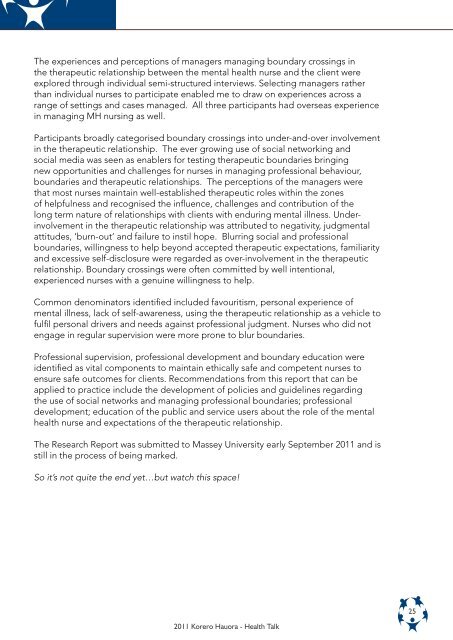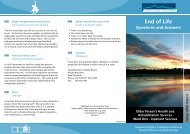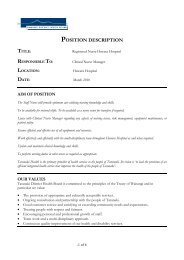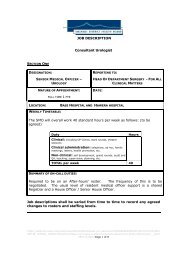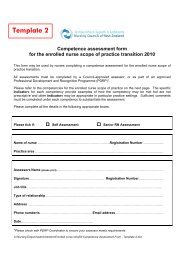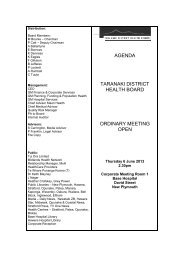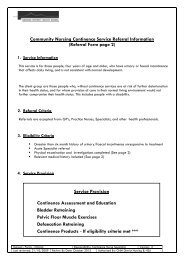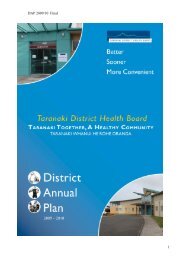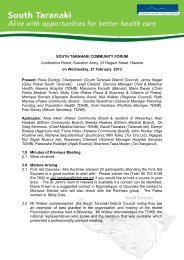The experiences and perceptions of managers managing boundary crossings inthe therapeutic relationship between the mental health nurse and the client wereexplored through individual semi-structured interviews. Selecting managers ratherthan individual nurses to participate enabled me to draw on experiences across arange of settings and cases managed. All three participants had overseas experiencein managing MH nursing as well.Participants broadly categorised boundary crossings into under-and-over involvementin the therapeutic relationship. The ever growing use of social networking andsocial media was seen as enablers for testing therapeutic boundaries bringingnew opportunities and challenges for nurses in managing professional behaviour,boundaries and therapeutic relationships. The perceptions of the managers werethat most nurses maintain well-established therapeutic roles within the zonesof helpfulness and recognised the influence, challenges and contribution of thelong term nature of relationships with clients with enduring mental illness. Underinvolvementin the therapeutic relationship was attributed to negativity, judgmentalattitudes, ‘burn-out’ and failure to instil hope. Blurring social and professionalboundaries, willingness to help beyond accepted therapeutic expectations, familiarityand excessive self-disclosure were regarded as over-involvement in the therapeuticrelationship. Boundary crossings were often committed by well intentional,experienced nurses with a genuine willingness to help.Common denominators identified included favouritism, personal experience ofmental illness, lack of self-awareness, using the therapeutic relationship as a vehicle tofulfil personal drivers and needs against professional judgment. Nurses who did notengage in regular supervision were more prone to blur boundaries.Professional supervision, professional development and boundary education wereidentified as vital components to maintain ethically safe and competent nurses toensure safe outcomes for clients. Recommendations from this report that can beapplied to practice include the development of policies and guidelines regardingthe use of social networks and managing professional boundaries; professionaldevelopment; education of the public and service users about the role of the mentalhealth nurse and expectations of the therapeutic relationship.The Research Report was submitted to Massey University early September 2011 and isstill in the process of being marked.So it’s not quite the end yet…but watch this space!252011 <strong>Korero</strong> <strong>Hauora</strong> - <strong>Health</strong> <strong>Talk</strong>
Specialist Clinical Nurse – ExerciseTolerance Testing and Pre AssessmentClinicMy Journey to Masters of Nursing through The Universityof Auckland and Nurse Practitioner Cardiology focus.By Jo-Ann Downie, RN, On final pathway to Mastersof Nursing 2011, Specialist Clinical Nurse /NurseCoordinator - AngiographyLeft: Jo Downie assessing Lauren in the Cardiology Clinic.Well it was only ever going to beone paper!“Ok” I said to my Manager at thetime, “I will do this paper”, it wasthe Specialty Nursing - CardiacFocus paper N730 A+B. “Great”says Chris Gruys when I applied,“you will be the first one in<strong>Taranaki</strong> to complete this paper”,‘Yeah great’ I thought, ‘no-oneto ask questions to’. However,I could not believe how muchI enjoyed the paper, the wholeaspect of learning through theUniversity of Auckland was great,I found that the online supportwas fantastic from the tutor, andthis has been the case for allof the papers that I have donesince.After I completed and passedthat paper, struggled throughreferencing it properly – heavenforbid I plagiarised something, aswell as learning how to attemptto write a three thousand wordassignment at post graduatelevel, I thought – ‘well this isnot too bad, perhaps I shouldcomplete my Post GraduateCertificate’. And especially sinceI used so much of what I learnt“in school”, and applying thisknowledge to the patients Inursed, assessed and educated,along with their families/whanau.All of a sudden I was able to readan ECG, listen to heart and lungsounds and have a good ideaof what the doctors were talkingabout, as well as feel like I couldask more in-depth questions andunderstand the responses.Again I went and spoke toChris who was fantastic, shewent through the papers thatwere going to be held hereat <strong>Taranaki</strong>, I chose two morepapers to do the following yearto complete my Post GraduateCertificate. Chris then helpedme with my funding applicationand has supported me from thenonwards to keep going, that wasback in 2006.Every single paper I have donehas been a huge learning curve,and yes it is hard to work fulltime, raise a family and study,all the while keeping your sanityfairly well intact, but I have foundit so very worthwhile. I don’tknow about you, but for me thefact of learning why doctorsespecially do what they do totry and diagnose and then treatpatients is cool, little light bulbswent on all of the time. ‘Ooohhh,so that’s why’ happenedconstantly in my head. Mycolleagues also got used to mespouting off bits of informationthat I had recently learnt duringmy papers.I don’t feel like any of the papers2011 <strong>Korero</strong> <strong>Hauora</strong> - <strong>Health</strong> <strong>Talk</strong>that I have done have been awaste of my time, and they havealso helped me to advance in mynursing career and achieve thegoals that I have set myself alongthe way. Some of the papers Ichose were practical hands oncourses, such as the AdvancedAssessment and ClinicalReasoning paper, others helpedme look at myself and my nursingpractice, such as the Scholarshipof Practice paper.I love the fact that I am fairlyautonomous in my workenvironment, especially whenrunning nurse-led clinics. I wouldnever have been able to functionat this level in my roles if I hadn’tstudied.Now I cannot believe that I am inmy last semester of my Masters,it is a fantastic feeling knowingthat I have achieved this, andbelieve you me, if I can do it,anyone can!My next challenge is toundertake and complete myprescribing practicum with a viewto becoming a Nurse Practitionerwith a Cardiac focus.“In spite of them being so busy,they always had time for me, andI never felt like just another casefile. They were really skilled andprofessional all the time.”26


